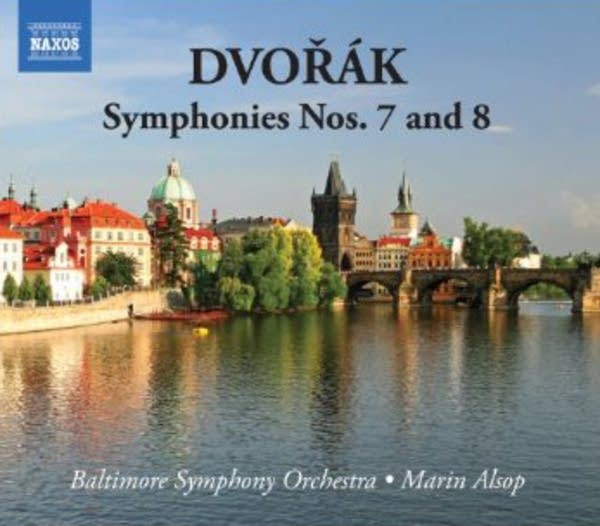
When Marin Alsop arrived as music director of the Baltimore Symphony in 2007, she brought with her a valuable connection to the recording industry. The end result is several new releases from the Baltimore Symphony Orchestra, which hadn't recorded in almost a decade. Their first project with Naxos Records was a Dvorak Symphony cycle starting with the "New World" Symphony, which earned rave reviews. Their latest recording in that cycle explores the dramatic contrasts between Dvorak's Symphony No. 7 and 8.
Antonin Dvorak was a Czech musician who avoided his father's chosen path as a butcher by becoming a violinist, a violist and a composer. Bedrich Smetana may have been the father of Czech music, but it was Dvorak who helped popularize it. He was known for his sunny, outgoing personality, which is heard even in his darkest, moodiest compositions like his Symphony No. 7 in d minor. The opening theme of this symphony came to Dvorak at the Prague railway station. He had gone there to witness the arrival of Hungarian patriots who were coming to the National Theater Festival. Dvorak captures the mood of this political journey by creating an oppressive, somber atmosphere in the first movement. Cellos and violas play the opening theme. Sharp rhythmic upbeats and dramatic crescendos and decrescendos accentuate the political turmoil faced by these anti-Habsburg rebels.
The virtuosic soloists within the Baltimore Symphony Orchestra really shine in the second movement, which is marked Poco adagio. This movement starts with a clarinet melody in F major followed by another melody for flutes and oboes that explores new harmonies. Another theme is introduced by violin and cello, and then the rich colors of the horn explode into a gorgeous theme.
The third movement is the Scherzo ("Vivace"), which is a favorite for most musicians because Dvorak, who spent many years playing in an orchestra himself, gives every member of the orchestra something thrilling to play. Various cross-rhythms make this movement very intriguing. While the violins and violas have three beats per measure, the cello and bassoons have just two, making this a somewhat light-hearted, yet very energetic movement.
Dvorak composed his Symphony No. 8 in G major at his country house in the village of Vysoka, just south of Prague. That peaceful environment freed Dvorak's mind, allowing him to conceive, almost as an afterthought, the luscious recurring theme in the first movement, played by the cellos, clarinets, bassoons and horns.
The second movement is a reflection of the idyllic surroundings of the Czech countryside. This Adagio is almost a miniature tone poem of village life, with the sounds of a rustic country band and bird songs fluttering in the woodwinds.
A graceful g minor waltz is at the head of the third movement, with a contrasting trio section that Dvorak borrowed from his comic opera, "The Stubborn Lovers."
The finale is a concoction of wandering variations with numerous orchestral effects, like virtuosic flute passages and high horns blasting their way to the finish line.
Dvorak once said, "Mozart is sunshine." I think the same can be said of Dvorak. In these live recordings from Joseph Meyerhoff Symphony Hall in Baltimore, Marin Alsop and the Baltimore Symphony Orchestra bring new ideas to light in these works, thanks to these crisp performances that let you listen to these dramatic symphonies with fresh ears.
(This is an encore broadcast of an episode of New Classical Tracks that originally aired on July 7, 2010.)
Love the music?
Show your support by making a gift to YourClassical.
Each day, we’re here for you with thoughtful streams that set the tone for your day – not to mention the stories and programs that inspire you to new discovery and help you explore the music you love.
YourClassical is available for free, because we are listener-supported public media. Take a moment to make your gift today.
Your Donation
About New Classical Tracks®
Host Julie Amacher provides an in-depth exploration of a new classical music release each week.
Subscribe on Apple Podcasts, Spotify, Radio Public, or RSS.












